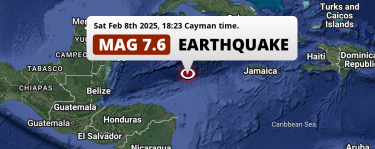Latest earthquakes near Cuba today
Complete overview of the latest earthquakes near the country Cuba, updated every minute. Did you feel an earthquake today in Cuba? If an earthquake is happening right now near Cuba, it will show up within minutes.
Recent Cuba Earthquake News
These are the latest articles published related to earthquakes occurring near Cuba. Check our Earthquake News section for a complete overview of articles written on earthquakes near Cuba and elsewhere.
Cuba Earthquake Statistics
Average
A total of 225 earthquakes with a magnitude of four or above have struck within 300 km (186 mi) of Cuba in the past 10 years. This comes down to a yearly average of 22 earthquakes per year, or 1 per month. On average an earthquake will hit near Cuba roughly every 16 days.
A relatively large number of earthquakes occurred near Cuba in 2021. A total of 84 earthquakes (mag 4+) were detected within 300 km of Cuba that year. The strongest had a 7.2 magnitude.

Magnitude Distribution
The table below visualizes the distribution of all earthquakes that occurred within 300km of Cuba in the past 10 years. No earthquakes with a magnitude of 8 or above have occurred near Cuba during this time. Usually, higher magnitudes are less common than lower magnitudes. Small earthquakes with a magnitude below 4 on the Richter scale have been omitted from this overview.
| Magnitude | Earthquakes | Percentage |
|---|---|---|
| Mag. 4 | 202 | 89.78% |
| Mag. 5 | 20 | 8.89% |
| Mag. 6 | 1 | 0.44% |
| Mag. 7 | 2 | 0.89% |
| Mag. 8 | 0 | 0.0% |
| Mag. 9 | 0 | 0.0% |
| Mag. 10 | 0 | 0.0% |
Strongest earthquakes near Cuba
The strongest recent earthquake of the past 10 years near Cuba occurred on Jan 28, 2020 14:10 local time (America/Havana timezone). It had a magnitude of 7.7 and struck 199 kilometers (124 mi) west-southwest of Manzanillo, at a depth of 15 km. Discover more strong earthquakes near Cuba in the list below.
In the table below you will find the strongest earthquakes that occurred near Cuba in the past 10 years. You can use the tabs to find the heaviest historic earthquakes since the year 1900 or within a specific year or distance from Cuba.
Earthquakes by region of Cuba
Click the links below for earthquake reports for regions in Cuba.
- Aremisa (Artemisa)
- Camagüey
- Ciego de Ávila
- Cienfuegos
- Granma
- Guantánamo
- Havana (La Habana)
- Holguín
- Isla de la Juventud
- Las Tunas
- Matanzas
- Mayabeque
- Pinar del Río
- Sancti Spíritus
- Santiago de Cuba
- Villa Clara
Frequently Asked Questions
These questions are commonly asked in relation to earthquakes occurring near Cuba.
When was the last earthquake in Cuba?
A 2.6 magnitude earthquake hit near Cuba on the night of April 1, 2025 at 03:26 local time (America/Havana). The center of this earthquake was located 295km south-east of Guantánamo at a depth of 19km under water in the Caribbean Sea. Check the list on our website for any earthquakes occurring near Cuba in the past hours.
What was the strongest earthquake near Cuba?
A 7.7 magnitude earthquake hit near Cuba on the afternoon of January 28, 2020 at 14:10 local time (America/Havana). The center of this earthquake was located 199km west-southwest of Manzanillo at a depth of 15km under water in the Caribbean Sea. This is the strongest earthquake that occurred near Cuba since the year 1900.
How often do earthquakes occur near Cuba?
In the past 10 years, 225 earthquakes with a magnitude of four or higher occurred within a 300 kilometer range from Cuba. This averages to 23 earthquakes yearly, or one earthquake every 16 days.













 Feb 8, 2025 06:23PM
On Saturday Evening an Unusually powerful M7.6 Earthquake struck in the Caribbean Sea 209km from George Town (Cayman Islands).
Feb 8, 2025 06:23PM
On Saturday Evening an Unusually powerful M7.6 Earthquake struck in the Caribbean Sea 209km from George Town (Cayman Islands).
